Diet high in methionine could increase risk of Alzheimers

(PhysOrg.com) -- Temple study suggests that an amino acid found in red meats, fish, beans and other foods may increase possibility of dementia.
A diet rich in methionine, an amino acid typically found in red meats, fish, beans, eggs, garlic, lentils, onions, yogurt and seeds, can possibly increase the risk of developing Alzheimer’s disease, according to a study by Temple researchers.
The researchers published their findings, titled “Diet-induced hyperhomocysteinemia increases Amyloid-β formation and deposition in a mouse model of Alzheimer’s disease,” in the journal Current Alzheimer Research.
“When methionine reaches too high a level, our body tries to protect itself by transforming it into a particular amino acid called homocysteine,” said lead researcher Domenico Praticň, an associate professor of pharmacology in the School of Medicine. “The data from previous studies show — even in humans — when the level of homocysteine in the blood is high, there is a higher risk of developing dementia. We hypothesized that high levels of homocysteine in an animal model of Alzheimer’s would accelerate the disease.”
Using a seven-month old mouse model of the disease, they fed one group an eight-month diet of regular food and another group a diet high in methionine. The mice were then tested at 15 months of age — the equivalent of a 70-year-old human.
“We found that the mice with the normal diet had normal homocysteine levels, but the mice with the high methionine diet had significantly increased levels of homocysteine, very similar to human subjects with hyperhomocysteinemia,” said Praticň. “The group with the high methionine diet also had up to 40 percent more amyloid plaque in their brains, which is a measurement of how much Alzheimer’s disease has developed.
The researchers also examined capacity to learn a new task and found it diminished in the group with the diet high in methionine.
Still, Praticň emphasized, methionine is an essential amino acid for the human body and
“stopping one’s intake of methionine won’t prevent Alzheimer’s. But people who have a diet high in red meat, for instance, could be more at risk because they are more likely to develop this high level of circulating homocysteine,” he said.
In addition to Praticň, other researchers working on the study included Jia-Min Zhuo and Hong Wang from Temple’s Department of Pharmacology, Thomas J. Gould and George S. Portugal from Temple’s Department of Psychology, and Warren D. Kruger from the Fox Chase Cancer Center.















